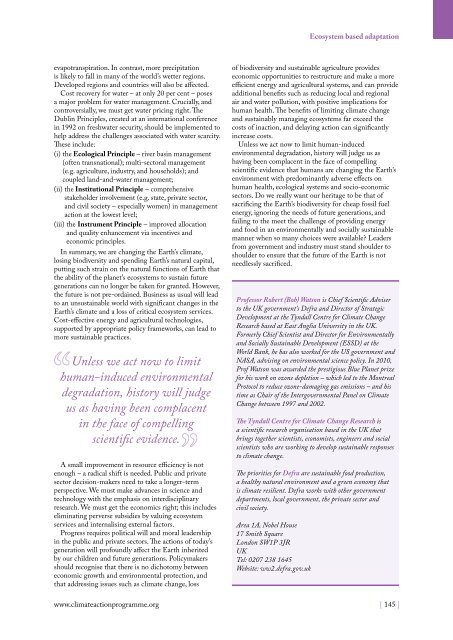Climate Action 2010-2011
You also want an ePaper? Increase the reach of your titles
YUMPU automatically turns print PDFs into web optimized ePapers that Google loves.
Ecosystem based adaptation<br />
evapotranspiration. In contrast, more precipitation<br />
is likely to fall in many of the world’s wetter regions.<br />
Developed regions and countries will also be affected.<br />
Cost recovery for water – at only 20 per cent – poses<br />
a major problem for water management. Crucially, and<br />
controversially, we must get water pricing right. The<br />
Dublin Principles, created at an international conference<br />
in 1992 on freshwater security, should be implemented to<br />
help address the challenges associated with water scarcity.<br />
These include:<br />
(i) the Ecological Principle – river basin management<br />
(often transnational); multi-sectoral management<br />
(e.g. agriculture, industry, and households); and<br />
coupled land-and-water management;<br />
(ii) the Institutional Principle – comprehensive<br />
stakeholder involvement (e.g. state, private sector,<br />
and civil society – especially women) in management<br />
action at the lowest level;<br />
(iii) the Instrument Principle – improved allocation<br />
and quality enhancement via incentives and<br />
economic principles.<br />
In summary, we are changing the Earth’s climate,<br />
losing biodiversity and spending Earth’s natural capital,<br />
putting such strain on the natural functions of Earth that<br />
the ability of the planet’s ecosystems to sustain future<br />
generations can no longer be taken for granted. However,<br />
the future is not pre-ordained. Business as usual will lead<br />
to an unsustainable world with significant changes in the<br />
Earth’s climate and a loss of critical ecosystem services.<br />
Cost-effective energy and agricultural technologies,<br />
supported by appropriate policy frameworks, can lead to<br />
more sustainable practices.<br />
Unless we act now to limit<br />
human-induced environmental<br />
degradation, history will judge<br />
us as having been complacent<br />
in the face of compelling<br />
scientific evidence.<br />
A small improvement in resource efficiency is not<br />
enough – a radical shift is needed. Public and private<br />
sector decision-makers need to take a longer-term<br />
perspective. We must make advances in science and<br />
technology with the emphasis on interdisciplinary<br />
research. We must get the economics right; this includes<br />
eliminating perverse subsidies by valuing ecosystem<br />
services and internalising external factors.<br />
Progress requires political will and moral leadership<br />
in the public and private sectors. The actions of today’s<br />
generation will profoundly affect the Earth inherited<br />
by our children and future generations. Policymakers<br />
should recognise that there is no dichotomy between<br />
economic growth and environmental protection, and<br />
that addressing issues such as climate change, loss<br />
of biodiversity and sustainable agriculture provides<br />
economic opportunities to restructure and make a more<br />
efficient energy and agricultural systems, and can provide<br />
additional benefits such as reducing local and regional<br />
air and water pollution, with positive implications for<br />
human health. The benefits of limiting climate change<br />
and sustainably managing ecosystems far exceed the<br />
costs of inaction, and delaying action can significantly<br />
increase costs.<br />
Unless we act now to limit human-induced<br />
environmental degradation, history will judge us as<br />
having been complacent in the face of compelling<br />
scientific evidence that humans are changing the Earth’s<br />
environment with predominantly adverse effects on<br />
human health, ecological systems and socio-economic<br />
sectors. Do we really want our heritage to be that of<br />
sacrificing the Earth’s biodiversity for cheap fossil fuel<br />
energy, ignoring the needs of future generations, and<br />
failing to the meet the challenge of providing energy<br />
and food in an environmentally and socially sustainable<br />
manner when so many choices were available? Leaders<br />
from government and industry must stand shoulder to<br />
shoulder to ensure that the future of the Earth is not<br />
needlessly sacrificed.<br />
Professor Robert (Bob) Watson is Chief Scientific Adviser<br />
to the UK government’s Defra and Director of Strategic<br />
Development at the Tyndall Centre for <strong>Climate</strong> Change<br />
Research based at East Anglia University in the UK.<br />
Formerly Chief Scientist and Director for Environmentally<br />
and Socially Sustainable Development (ESSD) at the<br />
World Bank, he has also worked for the US government and<br />
NASA, advising on environmental science policy. In <strong>2010</strong>,<br />
Prof Watson was awarded the prestigious Blue Planet prize<br />
for his work on ozone depletion – which led to the Montreal<br />
Protocol to reduce ozone-damaging gas emissions – and his<br />
time as Chair of the Intergovernmental Panel on <strong>Climate</strong><br />
Change between 1997 and 2002.<br />
The Tyndall Centre for <strong>Climate</strong> Change Research is<br />
a scientific research organisation based in the UK that<br />
brings together scientists, economists, engineers and social<br />
scientists who are working to develop sustainable responses<br />
to climate change.<br />
The priorities for Defra are sustainable food production,<br />
a healthy natural environment and a green economy that<br />
is climate resilient. Defra works with other government<br />
departments, local government, the private sector and<br />
civil society.<br />
Area 1A, Nobel House<br />
17 Smith Square<br />
London SW1P 3JR<br />
UK<br />
Tel: 0207 238 1645<br />
Website: ww2.defra.gov.uk<br />
www.climateactionprogramme.org | 145 |












